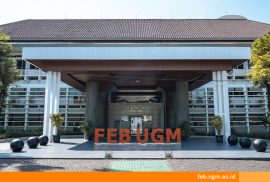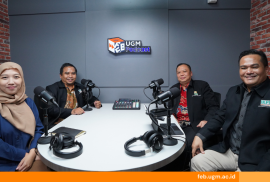On Thursday, 25 August 2016, the Faculty of Economics and Business Universitas Gadjah Mada (FEB UGM) held a public lecture on “The Strategy Advancement of Financial Education and Inclusion” in BRI Auditorium, Master of Science and Doctorate Program Building. The keynote speaker was Dr. Kusumaningtuti S. Soetiono, S.H., L.L.M., Financial Services Authority (Otoritas Jasa Keuangan/OJK) Board of Commissioner for Education and Consumer Protection. Prof. Insukindro was the moderator at the event.
The public lecture was part of a series of event held by Indonesia Financial Service Authority (OJK) and Faculty of Economics and Business Universitas Gadjah Mada (FEB UGM). Previously, OJK and FEB UGM had signed an agreement regarding Center for Financial Literacy and Inclusion Studies (Pusat Riset Literasi dan Inklusi Keuangan/PRLIK) in Kertanegara Room FEB UGM.
According to Kusumaningtuti, a country with a high level of financial education and inclusion tends to have a high economic growth, which will result in the advancement of the society welfare. In order to increase the financial education in Indonesia, OJK had set its targets to university students, women and/or housewives, UMKM or professionals, and the retired.
In 2013, the level of financial education in Indonesia was 21.8%, meaning that among 100 people, only 21 people were financially literate. Stock Market (Pasar Modal) has the lowest level of financial education compared to other financial instruments, such as insurance, leasing, pension fund, and pawning system.
On the other hand, the level of financial inclusion only reached 59.7% which meant that among 100 of Indonesian people, only 59 people had a bank account, insurance, reksadana, sukuk or bond. The low level of financial education in Indonesia is illustrated by the amount of credit owned by the Small and Medium Business (UMKM), which was only 780 billion per April 2016 or 18.5%, the low number of insurance holders of 2.25% of all Indonesian people, the pension fund holders comprising only 4 million people or 1.6% of all Indonesia people, and the investors in the market bond amounting to a total of less than 500 hundred people or less than 0.2% of all Indonesian citizens.
Kusumaningtuti said that according to the research conducted by Bank Indonesia or even the World Bank, there were some indicators, which could identify the level of financial education within a society. These indicators include the numbers of ATMs, bank offices, and the density of bank offices within a region. The density of bank offices is categorized into two types; under-bank, and over-bank. In Indonesia, the density level showed that Java region is categorized as over-bank. The discrepancy of the numbers of bank offices resulted in the low level of financial education and inclusion in the remote area.
The level of financial management among Indonesian people is distressing. The trend shows that the Marginal Propensity to Consume of Indonesian society is getting higher. The low awareness of the society of saving money is its main cause. In order to overcome the problem, OJK initiates an interesting saving product for children.
Today, Indonesia is entering the world of Digital Financing Service. According to the amount and the transaction volume, there is an indreasing trend in e-banking. The increasing of digital transactions must be followed by the advancement of financial education and literation. To catch up to other countries, OJK decided to implement the three pillars, namely: massive education, infrastructure, innovation and creation. OJK implements the first pillar is conducted by visiting at 24 cities per year at the minimum. The second pillar is conducted by developing infrastructure technology, which supports to the society services. The third pillar is innovation and creation to identify the needs if the people so thatthe ongoing program will suit the characteristics of the society.
According to Irma, the education division of OJK interviewed after the public lecture stated that the efforts to infrease financial literacy education start from students and lecturers. After receiving the education, they should disseminate it to the society of community through thematic Community Service, Forum Group Discussion, training or research.
It is hoped that this event can contribute to the increase of Indonesian financial education and inclusion and its coverage, including remote areas in the country.
Source: EBNews




